
A few months back, Sasin Graduate Institute of Business Administration of Chulalongkorn University in Bangkok, Thailand got its new Director (Dean) Dr Dipak C. Jain who has been a visiting professor of marketing since 1989 at the B school.
Dr Dipak Jain is also INSEAD Chaired Professor of Marketing. He had served as Dean of INSEAD since his appointment from May 2011 to March 2013. He was Dean of Northwestern University’s Kellogg School of Management from 2001-2009. He was also Sandy and Morton Goldman Professor of Entrepreneurial Studies & Professor of Marketing at the Kellogg School of Management, where he had been a member of the faculty since 1987.
Dr Jain’s areas of research include the marketing of high-tech products; market segmentation and competitive market structure analysis; cross-cultural issues in global product diffusion; new product diffusion; and forecasting models. He has had more than 50 articles published in leading academic journals.
In an exclusive interview with MBAUniverse.com Dr Jain shares his future priorities and vision as the dean of Sasin. Edited excerpts from Dr Jain’s interview follow
MBAUniverse.com: As the former Dean of Kellogg and INSEAD, and now SASIN, how do you see the world of management education today.
Dr Dipak Jain: The MBA degree, and the schools that provide this education, have enduring value. I think this is so precisely because of the volatility, complexity and uncertainty in our business world. The challenges we face demand exceptional leadership. Today, managers and leaders are called upon to anticipate change and have the skills to adapt quickly to new circumstances and challenges. Business schools provide the knowledge to succeed and create value in this environment. I remain passionate about putting the tools of management to good use to create a better world.
MBAUniverse.com: There has been a criticism on its ROI, Impact, Relevance? In a superfast changing VUCA world, what role does B-schools play
Dr Dipak Jain: That said, to remain relevant, business schools must embrace a somewhat larger, more ambitious mission—one that combines what I call ‘performance + purpose.’ To do so, requires schools to focus on academic excellence, business relevance, and social significance. Traditional shareholder value remains an important consideration. But alongside this focus must be another perspective that engages diverse stakeholders. Business should be an engine for progress and innovation that creates a stronger, safer society. Material prosperity is a part of this effort, but no longer the sole metric for success.
MBAUniverse.com: After a very long and successful Deanships in US & later Europe, you decided to move to Asia– to SASIN Thailand. What prompted this move to Asia in general & SASIN in particular?
Dr Dipak Jain: I am attracted by all the dynamism and activity in the ASEAN region. There are exciting developments underway here that provide me with a great opportunity to keep learning and to contribute in fresh ways. I also have a long association with Sasin, having been part of the school’s faculty for a quarter century, so I know the institution well. I admire the ideas, ideals and individuals that have enabled Sasin to thrive for more than 30 years. Bangkok is a vibrant, modern city and I’ve always found Thailand’s hospitality and culture invigorating.
My goal is to bring my experiences from INSEAD and the Kellogg School to help Sasin become the leading ASEAN management institution. As a dean in the U.S., I learned a lot about processes and how to run a large and diverse academic organization. As a dean of a European business school, I gained great insights into managing cross-cultural diversity. Now in Asia, I think there is a wonderful opportunity to help Sasin leverage the market dynamics and enthusiasm among the younger demographic groups. Of course, as an Indian native, I am driven by my Indian values. These values help me adapt well to the cultural setting of Sasin.
MBAUniverse.com: A question on state of Asian Management Education. Asian ME has huge scale, but we rank poorly on global accreditations & ranking tables. How do you look at the current state of Asian ME.
Dr Dipak Jain: It’s true that business education is enjoying great growth throughout Asia. It’s also true that there is wide variance of quality among programs. I think this reality has much to do with the fact that, traditionally, Asian businesses were more driven by families. By what we call small ‘mom-and-pop’ stores rather than large enterprises as we see in the West. These smaller outlets limited their activity to the local area where the entrepreneurial family lived.
Then, too, it’s important to remember that the modern business school is really a creation of Western culture. It began in Germany and then wide gained popularity in America. As a result, many people in Asia left the region to pursue their MBAs in the U.S.
Now, with growth of MBA programs in Asia, many people are staying closer to home to earn their business education. I believe it is a matter of time and attention by the deans and the private/public sectors to really strengthen the overall quality of management instruction in Asia. It will happen. This is an opportunity for Asian schools to build relationships with the private sector, and with entrepreneurs and businesses, to create a unified working relationship. I strongly believe that the best days of Asia are ahead.
MBAUniverse.com: What role Asian ME & Asian B-schools play in the next phase of growth of global MBA education? How can it ‘leapfrog’ in its repute, contribution and impact at a global stage?
Dr Dipak Jain: The dynamics of Asia markets have attracted the attention of the world. A lot of global businesses are coming to this region, eager to be part of the commercial excitement. These circumstances offer a great opportunity for Asian schools to focus on knowledge creation and dissemination. They can develop new research paradigms and case studies that can be used more broadly in other schools. By creating this ‘culture of research,’ the schools will build an exceptional reputation in the region and beyond.
MBAUniverse.com: Finally, what is your vision for SASIN. What will be your key strategies to achieve this vision?
Dr Dipak Jain: To make Sasin the leading business school for the ASEAN region. I believe Sasin can become a true center for human talent development. To do so, requires providing the environment and resources to combine academic excellence, business relevance and social significance. I think of this as cultivating the Mind, Body and Soul. Business and the schools that educated leaders should adopt a focus on ‘performance and purpose.’ By this, I mean the schools should prepare students with the knowledge to cultivate both shareholder value and broader stakeholder value that earns financial ROI as well as ‘social ROI.’
For Sasin, I think there is great opportunity to cultivate entrepreneurship as a key part of the brand, one that will help strengthen and differentiate the school in the market. This approach will provide students with modern insights that connect well with traditional business models in the region.
Stay tuned to MBAUniverse.com for more updates on Sasin Graduate Institute of Business Administration of Chulalongkorn



























